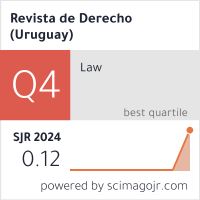Acceso a la justicia, prácticas abusivas y el paraíso de los apostadores
third party funding en la práctica arbitral internacional
Palavras-chave:
Arbitraje internacional, Financiamiento de terceros, Acceso a la justicia, Conflictos de interés, Deber de revelación, Medidas provisionales, Costos, Garantías por costosResumo
En el presente trabajo analizamos el financiamiento de terceros o third party funding en el arbitraje internacional. Si bien la regulación sobre el tema es escasa, el third party funding es una práctica bien establecida y generalmente aceptada por los tribunales arbitrales. Pero su existencia puede dar lugar a una serie de problemas que los árbitros deben resolver. Así, la presencia de un tercero financiador puede dar lugar a conflictos de interés; a la presentación de demandas abusivas y especulativas; o a que se frustre la ejecución de un laudo adverso sobre costos. Luego de describir en forma general el concepto y cómo funciona el third party funding, analizamos cómo los tribunales arbitrales se enfrentaron a estos problemas. En particular, analizamos los distintos deberes de revelación que han impuesto a las partes, y qué peso le han dado a la existencia de un tercero financiador a la hora de obligar a una parte a constituir una garantía por los costos del arbitraje (security for costs).
Downloads
Referências
BORN, G., International Commercial Arbitration, Segunda Edición, Kluwer Law International, 2014.
COMMISSION, J., “How much does an ICSID arbitration cost? A snapshot of the last five years”, disponible en Kluwer Arbitration Blog: arbitrationblog.kluwerarbitration.com.
CRAIG, L., PARK, W., PAULSSON, J., International Chamber of Commerce Arbitration, Tercera Edición, Oceana Publications, 2000.
DARWAZEH, N., LELEU, A., “Disclosure and security for costs or how to address imbalances created by third-party funding”, en Journal of International Arbitration, volume 33, Kluwer Law International, 2016.
EBERHARDT, P., OLIVET, C., “Profiting from injustice. How law firms, arbitrators and financiers are fuelling an investment arbitration boom”, Corporate Europe Observatory and the Transnational Institute, 2012.
FERNÁNDEZ MASIÁ, E., “La Financiación por Terceros en el Arbitraje Internacional. Third Party Funding in International Arbitration”, en Cuadernos de Derecho Transnacional, volumen 8, Nº 2, 2016.
GAILLARD, E., SAVAGE, J. (eds.), Fouchard, Gaillard, Goldman on International Commercial Arbitration, Kluwer Law International, La Haya, 1999.
GAUKRODGER, D., GORDON, K., “Investor-State Dispute Settlement: a scoping paper for the investment policy community”, OECD Working Papers on International Investment 2012/03.
GU, W., “Security for Costs in International Commercial Arbitration”, en Journal of International Arbitration, volumen 22, Nº 3, Kluwer Law International, 2005.
HARWOOD, M., BATIFORT, S., TRAHANAS, C.,“Third-party funding: security for costs and other key issues”, en LEGUM, B. (ed.), Investment treaty arbitration review, Segunda Edición, The Law Reviews, 2017.
KIRTLEY, W., WIETRZYKOWSKI, K., “Should an Arbitral Tribunal Order Security for Costs When an Impecunious Claimant Is Relying upon Third-Party Funding?”, en Journal of International Arbitration, Volumen 30, Nº 1, Kluwer Law International, 2013.
KRÖLL, S., LEW, J., MISTELIS, L., Comparative International Commercial Arbitration, Kluwer Law International, 2003.
MOSES, M., The Principles and Practice of International Commercial Arbitration, Segunda Edición, Cambdridge University Press, Nueva York, 2016.
PARK, W., ROGERS, C., “The arbitration agreement and arbitrability, third-party funding in international arbitration: The ICCA-Queen Mary Task Force”, en Austrian Yearbook on International Arbitration, Nº 113, 2015.
VON GOELER, J., Third-Party Funding in International Arbitration and its Impact on Procedure, International Arbitration Law Library, Volume 35, Kluwer Law International, 2016.
WAINCYMER, J., Procedure and evidence in International Arbitration, Kluwer Law International, 2012. “Report of the ICCA-Queen Mary task force on third-party funding in international arbitration”, The ICCA Reports No. 4, Abril 2018.


















 Este trabalho está sob uma licença de
Este trabalho está sob uma licença de 